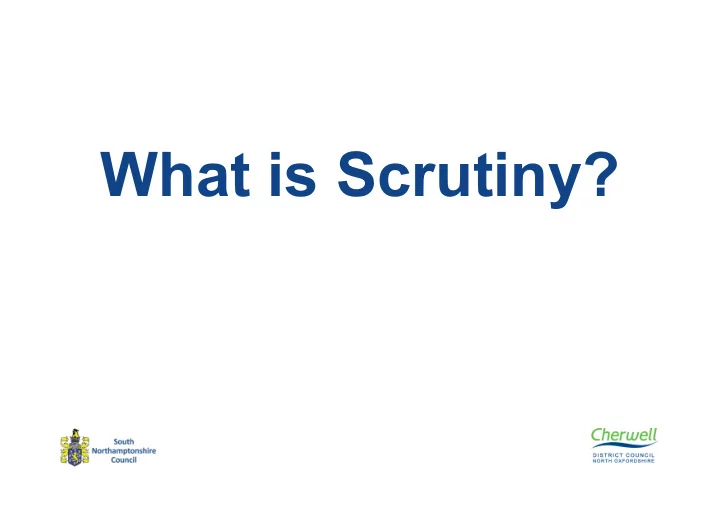

What is Scrutiny?
Scrutiny Committees have the following powers: • Review or or scrutinise decisions or actions taken in respect of any cabinet functions. • Review or scrutinise decisions or actions taken in respect of any functions which are not the responsibility of the Cabinet;
• They may also: Make reports or recommendations to Council or Cabinet on any of these matters, or on any matters which affect the Council’s area or its inhabitants.
The Four Principles of Scrutiny Good Scrutiny • Provides ‘ critical friend’ challenge to cabinet policy- makers and decision-makers • Enables the voice and concerns of the public and its communities • Is carried out by ‘ independent minded governors’ who lead and own the scrutiny process • Drives improvement in public services
The Five Roles of Scrutiny Policy Policy Development Review SCRUTINY Performance External Monitoring Scrutiny Holding the Cabinet to Account
Roles of Scrutiny Holding Cabinet to Account - review of cabinet decisions, pre-decision from forward plan or call-in - scrutiny of past performance or events P olicy Development - contribute to development of new council policies and strategies - carry out in-depth reviews on related issues
Roles of Scrutiny Policy Review - keep council policies and strategies under review, including in-depth reviews Performance Management - keep under review implementation of services, plans and strategies - contribute to improvement of performance, through using performance data to choose scrutiny topics
Roles of Scrutiny External Scrutiny - scrutiny of partnerships - holding to account other public services - joint working between county & district councils - scrutiny of health, community safety and police - representing the community and promoting the best interests and wellbeing of the area
Scrutiny Prioritisation Checklist Yes No Does the issue have a potential impact for the population of South Northants? Is it an issue of community concern? Does the issue match the strategic aims of the council? Will the scrutiny activity improve the overall performance and value for money provided by the council? Is it likely to get results? Is it an issue of concern to partners and interested parties? Are there adequate resources to do the scrutiny? Is the activity timely? If the answers to the If the answers to the above above questions are questions are mainly NO refer mainly YES prepare a the issue back. No further review scoping action required. document and add to the work programme.
Recommend
More recommend